In a small research on a representative sample of 1200 respondents interviewed face-to-face, we have got four questions about how Serbian citizens feel about other countries - and many different answers to these questions. This account of many different opinions is marred by the fact that, on average, a quarter of questions were left unanswered.
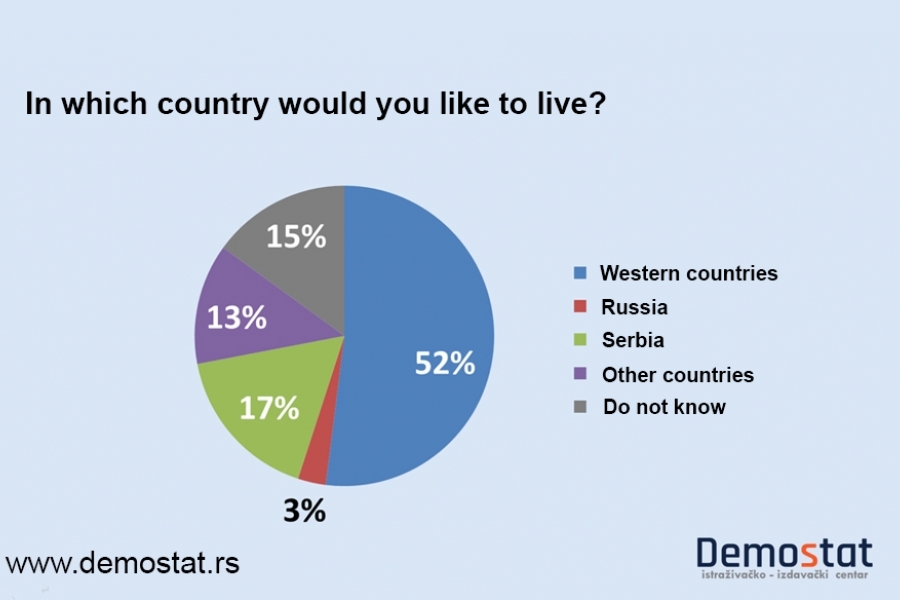
In a small research on a representative sample of 1200 respondents interviewed face-to-face, we have got four questions about how Serbian citizens feel about other countries - and many different answers to these questions. This account of many different opinions is marred by the fact that, on average, a quarter of questions were left unanswered.

1) More than half of respondents wish for Serbia with no foreign military bases (53%), but if the bases must be present in Serbia, then the respondents choose Russian bases (20%)
2) Russia is Serbias best friend of all (41%).
3) Germany (11%), Switzerland (7%), Austria, Italy, Sweden (5% each) are most often referred to as the countries in which the respondents would most like to live
4) Respondents would recommend to their children to live and work in Germany (16%), Switzerland (7%), Austria and Italy (5%), Sweden and Norway (4%)...
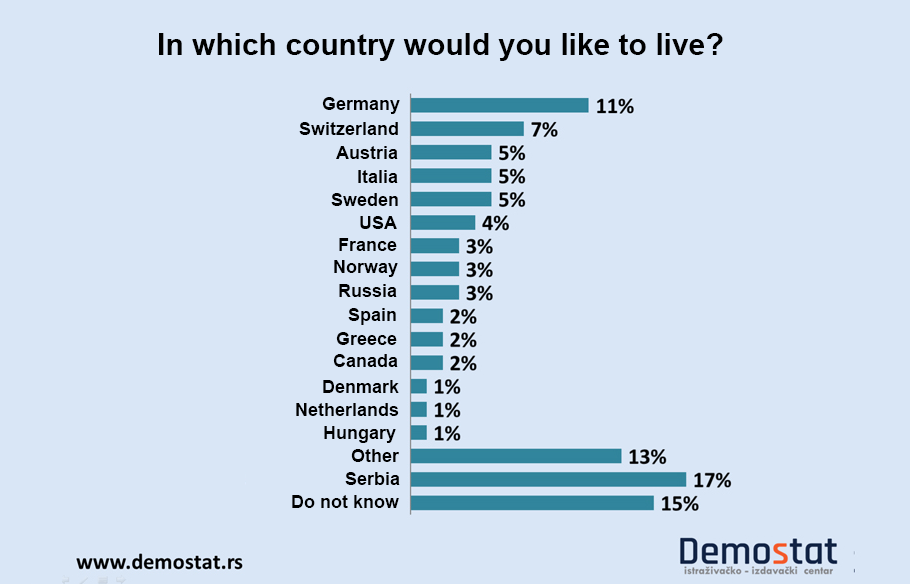
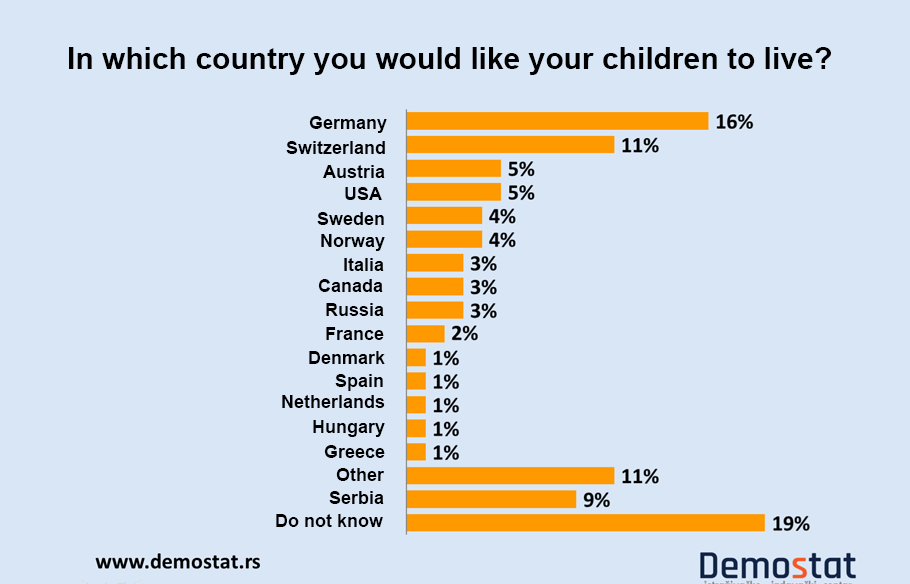
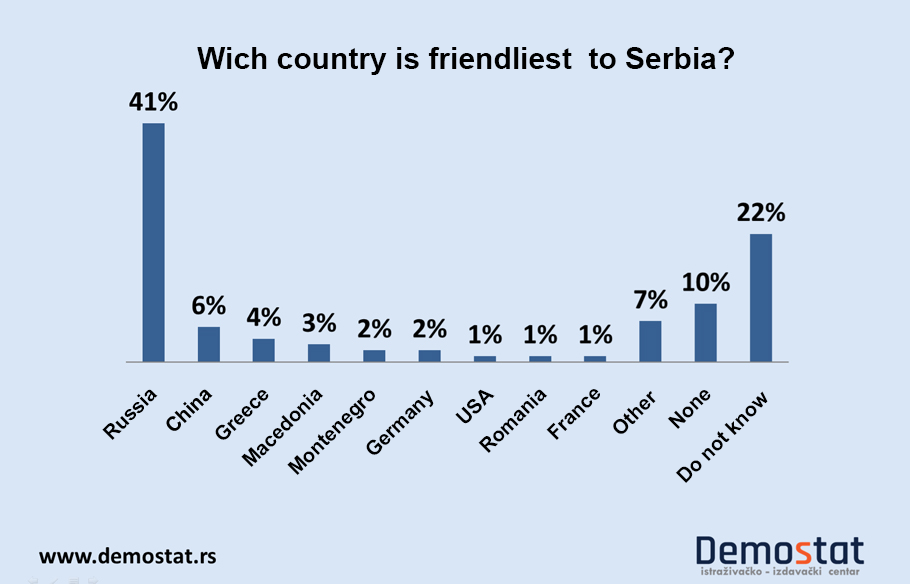
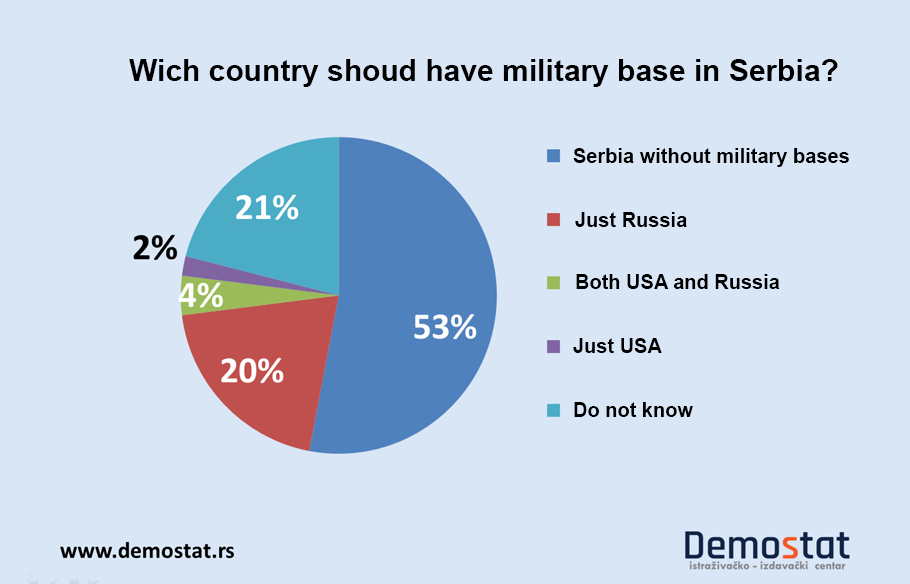
We examined the preferences of certain countries and the sociodemographic features. We found that the respondent’s sexes were not statistically significant in relation to the answers, and that there wasa more prominent connection between the answers and the age of the respondents as well as their working status. In the end, we also gave a few indications of the connection between the preferences of foreign countries and the electoral/political orientation of citizens.
Age: the youngest respondents prefer Germany as a country they would like to live in - thats the opinion of every sixth respondent between 18 and 25 years of age, and on average, Germany is prefered by every tenth respondent, in general. Respondents under 45 years of age are less likely than others to declare they would not live in a country other than Serbia, especially the youngest among them. The oldest respondents (75 years of age and over) choose Germany only in 2% of cases, while 32% are bound to Serbia (as opposed to the average - 17%).
When it comes to a country the respondents would recommend to the children, the youngest of them are characterized by the complete absence of choice, while the older than 65 years of age - by their affinity for Serbia. The number of non-responses to this question is greatest among the oldest and the smallest among the youngest of respondents.
The older the respondents, the more they pick Russia as Serbias best friend; 32% of the youngest are rusophilles, compared to 52% of the oldest respondents.
Education is the only factor that differentiates our sample of respondents, in the case of preferences of the country they would most like to live in. There we find that the more educated the respondents are, the more detached they are from Serbia (as the country they would like to live in): 28%-11%-12%-9%, while the average is 17%.
The employment status somewhat differentiates the answers, when it comes to the choice of country in which we would like to live - those employed as civil servants, as well as the unemployed, pick Germany in 15% of cases, slightly more than the average (10%). A small number of non-responses distinguishes students, as well as the civil servants; pensioners and farmers are distinguished by a large number of non-responses.
Housewives would recommend Germany to a greater extent to their children (21% compared to the average of 15%). Number of non-responses is lowest among civil servants (14%), and highest among the pensioners (29%).
The housewives see Russia as Serbias best friend to a lesser extent compared to the average (26% vs. 39%). They are also distinguished by a large number of non-answers to the same question (36%), while civil servants provide a small number of non-answers (17%).
Political orientations are, apparently, related to the foreign countries preferences. The orientations were indicated based on the vote in the last presidential elections, as well as statements about the choice the respondents would make in the next parliamentary elections. Due to the small number of respondents who didnt vote for Vucic and those who will not vote for the Serbian Progressive Party, we observed only the relations toward Vucic in context of the preferences of other countries.
The findings of this study point to a somewhat greater attachment to Russia of those who voted for Vucic, as well as those who will vote for the Serbian Progressive Party. Respondents who voted Vucic see Russia as Serbias biggest friend in 51% of cases, and those who will vote for the Serbian Progressive party in 54% of cases (while the average for the sample is 39%). Those who voted Vucic would "allow" the military bases in Serbia to Russia only in 28% of cases, while the average is 20%. In the end, 21% of Vucics voters would recommend Germany to their children, while the general average is 15%.
The Russian Levada centre has been systematically investigating, since 2006, which countries the Russian citizens consider to be friendly. In a survey conducted last year, Serbia is ranked the12th. Ranked better are: Belarus, Kazakhstan, China, India, Armenia, Cuba, Syria, Uzbekistan, Azerbaijan, Venezuela.
http://www.levada.ru/2016/06/02/13400/ pristup 5.9.2017.
In all societies there are issues that are rather being skipped. Certain...
The neoliberal path, started in 2001, has led to especially bad results in Serbi...
For centuries, the region was subsumed within the Ottoman and Hungarian Empires,...
"Serbia has returned to the systemic and anti-systemic position of the political...
In reality, Serbia is closer than ever to NATO. In the course of the last five y...